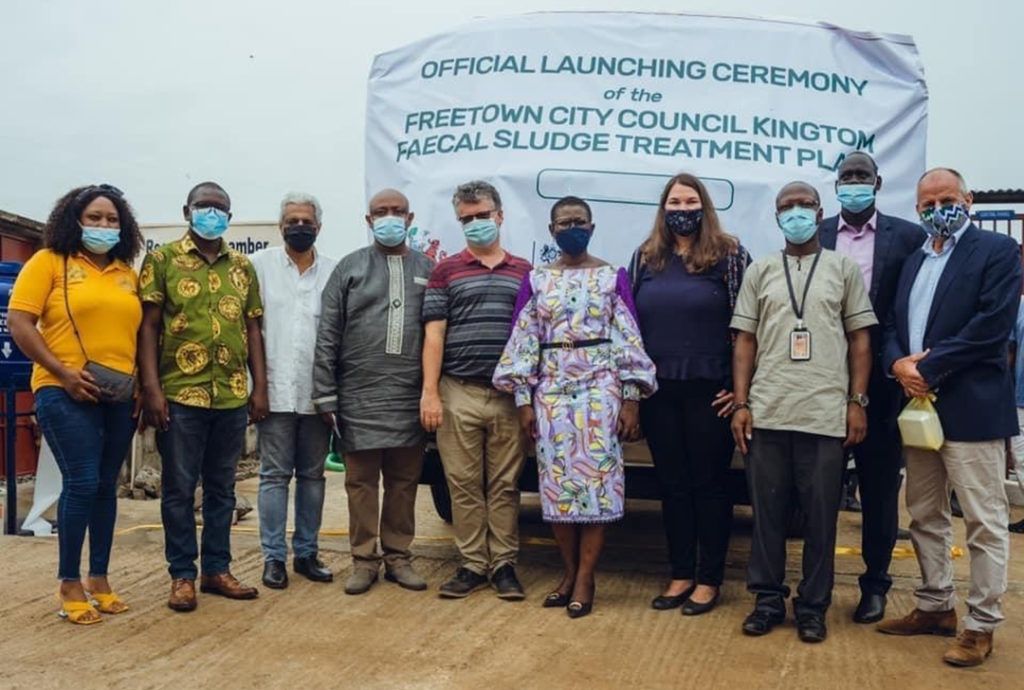 Press Release
Press Release
June 2, 2021 • 3 min read
GOAL, in partnership with Freetown City Council (FCC) and with technical support from Water-Share Ireland, has completed the development of Sierra Leone’s first wastewater treatment plant.
Funded by the Foreign, Commonwealth and Development Office (FCDO), the construction of the plant in Freetown is the first stage in transforming and improving the sanitation for more than one million people living in the Sierra Leonean capital.
The plant, which took two years to complete, is due for full commissioning in the coming months. While it will be handed over to FCC for operation, GOAL will continue to provide capacity building support.
Water-Share Ireland, a collaboration between GOAL and the Irish Water Services sector, contributed technical expertise to the project including feasibility design, a site visit and meetings in Freetown. In addition remote oversight of both the civil and mechanical/electrical elements was provided by experienced professionals in Ireland through Water-Share Ireland, working with the local GOAL team.
The Faecal Sludge Management Project will allow for mechanised faecal sludge treatment and safe disposal of liquid waste at Kingtom in Freetown. The faecal sludge arises from latrines across the city, and GOAL has been working to promote sludge management to try to reduce the pollution of roadside channels and the foreshore which result in public health issues. Prior to the project, there was no contained disposal area or treatment for faecal waste in the city.
Freetown is a growing city of 1.05 million people, and half a million barrels of raw faecal sludge is produced each year. Less than 10% is disposed of in the official dump at Kingtom, a 43-acre site in the middle of Freetown where approximately 5,000 people live.
This initial sludge treatment plant was constructed using geotextile dewatering technology and has the capacity to treat about 60m3 volume of faecal sludge per day.
The project is supporting the “Transform Freetown Agenda” being driven by the Mayor of Freetown, Yvonne Aki-Sawyerr OBE and will contribute greatly to the ambitious Transform Freetown target that by 2022, 60% of the city’s solid and liquid waste will be collected safely.
The Mayor described the completion of the plant as a “milestone” in the journey to address the challenges of an integrated waste management system for Freetown.”
She said: “The new infrastructure and systems now in place will enable us to move towards stopping a major sanitation and environmental crisis. This is a clear demonstration of what collaborations and partnerships can achieve.”
Jerry Grant, representing Water-Share Ireland, said “It was a privilege to engage colleagues across the Irish water sector to provide technical help and support to GOAL and Freetown City Council to realise this landmark project. Having visited the site, and met with the GOAL team and the Mayor Aki-Sawyer, a number of industry colleagues volunteered generously of their time and expertise. We look forward to continuing to help with capacity building for the sustainable operation of the facility.”

GOAL Sierra Leone Country Director, Gashaw Mekonnen, said: “The completion of the new treatment plant will accelerate our efforts to tackle the sanitation challenges in Freetown, and to sustainably build on the gains made from this project. I would like to thank FCDO for their generous support, her worship the Mayor and the FCC team, Water-Share Ireland and the Environmental Protection Agency who all supported us in the implementation of this project”.
Kobi Bentley, Development Director, British High Commission Sierra Leone, thanked GOAL and the other partners for “the partnership, collaboration and determination to get us to this point despite numerous challenges, not the least Covid-19”.
“If we can scale this plant up, replicate and learn from it this type of plant will play an important role in achieving the target of safely disposing 60% of liquid waste by 2022”.
